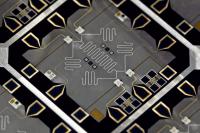Computation of prime factors is no longer a basic math problem when big numbers are considered, something like a 600-digit number, and then it becomes a demanding, long drawn out process.

Quantum processor
Recently, a team of analysts at UC Santa Barbara has come up with the concept and has fabricated a quantum processor that can factorize composite numbers; one example is the number 15 and its prime factors 5 and 3.
The finding is a giant stride in the path to creating a quantum computer that can factorize bigger numbers, which will have a big impact on cryptography and cybersecurity sectors. The finding can be accessed from the online version of the journal Nature Physics.
Erik Lucero, the paper’s main author, said that although 15 is a small number, the team has proved that they could run a rendition of Peter Shor’s prime factoring algorithm on a solid state quantum processor. A subsequent measure would be to increase quantum coherence times and fine-tune the processor to work on factoring bigger numbers. Lucero explained that factoring very big numbers is at the epicenter of cybersecurity conventions, such as the most used encoding called RSA encryption. A classical computer with the use of the classical top known algorithm would take an incredibly long time to factorize large numbers. A quantum computer can reduce this time by 15 times, which will be a great advantage, especially in the computer security sector.
Quantum cryptography is the solution to the issue of quantum computing making RSA encryption unsafe. Using quantum cryptography, if there is an unauthorized attempt to obtain data, the setup gets altered and the receiver and transmitter are both aware of it.
Disclaimer: The views expressed here are those of the author expressed in their private capacity and do not necessarily represent the views of AZoM.com Limited T/A AZoNetwork the owner and operator of this website. This disclaimer forms part of the Terms and conditions of use of this website.